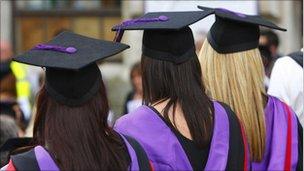University of Wales must review link-ups, advises QAA
- Published

The university has been advised to review all partnerships and draw up a plan for improvement
The higher education watchdog the Quality Assurance Agency (QAA) has advised the University of Wales to review all its partnerships with colleges worldwide.
It investigated three of the university's link-ups with foreign colleges which shed light on the shortcomings of a system in which academic staff from Wales travel across the globe to vet, validate and moderate overseas links.
In response, a University of Wales spokesman said the institution was making "many transitional and transformative measures".
"In order to continue to safeguard standards and the student experience the University of Wales will, in partnership with its proposed merger institutions, develop a new international strategy which is embedded within Wales," he said.
QAA has, in line with its policy, published a statement on its findings and recommendations on its website.
Here are excerpts from the report:
Accademia Italiana, Bangkok
Reason for investigation: BBC Wales alleged the college was operating illegally, according to Thai authorities.
"The concerns team wished to investigate whether any advice had been taken on legal or financial matters, since the University had provided no papers that indicated that such investigations had taken place.
"However, when the concerns team met with the vetter in a group of Validation Unit staff, he had no memory of having made a visit to Accademia Italiana in Bangkok."
"There was no investigation of the legal status of Accademia Italiana in Bangkok at any time."
"From later correspondence with the university, it has been confirmed that the university relied on assurances from Accademia Italiana in Bangkok that they had 'verbal confirmation' of the approval of the Thai authorities, but not 'approval in writing'.
"The concerns team concluded that the university's vetting of its partner in Thailand was inadequate... The 'validations' carried out were flawed".
"In the matter of approval by the Thai authorities, it appears that the University satisfied itself with oral assurances by Accademia Italiana that approval to operate from the Thai government had been secured, with no primary written evidence from the Thai authorities themselves."
Fazley International College, Malaysia
Reason for investigation: BBC Wales alleged it was being run by a pop star with two bogus degrees.
"No appraisal of the college's accounts", "no financial advice was sought", "no legal advice was sought on the capacity of the partner to contract".
"There is no particular reason to believe in this case had such investigations been carried out, they would have discovered anything that would have undermined the university's confidence...However, this must be regarded as merely good luck".
"The pro-forma tells the university that 'Dr' Yaakob holds a DBA from 'the European Business School, UK'.
"There is a 'European Business School, UK': it is part of Regents College, and awards degrees from the Open University.
"It does not award the degree of DBA. It is a perfectly respectable institution, but 'Dr' Yaakob certainly did not do a DBA there.
"'Dr' Yaakob is not buried in the small print... (the university) had and missed the opportunity to be circumspect about the management and owners of Fazley International College".
The concerns team found no sign that as managing director 'Dr' Fadzli Yaakob had any direct influence on the standards of programmes of study validated by the university.
"However... more 'academic' due diligence might have caused the university, if not to reject the connection with Fazley International Colelge, at least to manage it in a way that gave less room for ridicule".
Turning Point Business School, Singapore
Reason for investigation: Complaints from students. Unnanounced sale of the school by one set of owners who had problems with debts and subsequent disappearance of the second owners one year later, leaving the students unsupported.
The QAA say that "to judge the financial or legal standing of a potential partner, a committee of academics needs professional advice from an accountant or a lawyer; probably, in the case of an overseas partner, a lawyer from the country in question".
In this case University of Wales vice-chancellor, Professor Marc Clement, considered it "sufficient" that one member of the validation board was "qualified as an accountant".
"The university apparently took no legal advice, either in the UK or Singapore, as to the status of the owners."
"The university had not briefed staff involved in 'vetting' on the status of the investigations and judgments they made; and members of the committees charged with making recommendations or decisions did not have a common view as to what they were deciding upon."
The second owners, who later disappeared leaving the students in the lurch, were not checked out either.
"The background of the owners was not investigated, and no information about financial stability was sought. No professional advice was taken on either matter."
The university appoints moderators who must visit partner institutions twice a year for the first five years and once a year thereafter.
Initially, moderators failed to make any visits to this college.
These were replaced by moderators who did make the requisite visits, one of whom had been assigned to 14 different colleges simultaneously even though a moderator is only supposed to be assigned a maximum of five institutions at any time.
"In the light of the disappearance of the first owners, and the long list of unfulfilled demands made by moderators and Validation Unit staff in March 2010, the university's decision to accept the assertions of the new owners at face value... seems culpably credulous".